- Enquire Now
- About SI-Australia
- SI-Australia Office
- All Global Offices
- Course Search
- Application Services
- Free Service
- Top Universities Service
- Visa Service
- PhD Service
- Australia Application Process
- Australian Education System
- Australia University Rankings 2024
- All Australia Study Information
- University Profiles
- College Profiles
- University Subject Guides
- Study Options
- Study Blogs
- Study English


Book your Free Consultation
A member of the SI-Australia team will be in touch within 24 hours to arrange your initial consultation with one of our education experts.
- Australia Study Options
- PhD Degrees
PhD Degrees in Australia
A PhD is the highest degree awarded at global universities. PhD study is based on a substantial research project in an area of academic interest, typically up to 100,000 words in length, written as a thesis which must be defended in an oral examination at the end of the program. All PhD students are assigned a supervisor, and the duration of a PhD is typically three years full-time and six years part-time.
Very few research degrees feature taught modules, and as such a, student is expected to take more responsibility for their work and schedule. Universities in Australia are known for their academic excellence and state-of-the-art research infrastructure, along with their support for enterprise partnerships.
PhD Entry Requirements
Australian institutions are free to admit anyone to a PhD program, with admission generally conditional on the prospective student having completed an undergraduate degree with at least upper second-class honours, as well as a master's degree . English language ability proof is a must, and a minimum IELTS score of 6.5 is generally required. There is usually a first-year assessment of the remaining study, and the thesis is submitted at the end of the completed program.
Once you have decided on an area of research and have looked into how you will fund your study, there are a number of documents required when submitting your application. They include:
- Academic transcripts
- Academic references
- Personal statement
- Research proposal
- PhD Research Proposal
A research proposal is required by all students when applying to study for a PhD. The proposal should address the research you wish to undertake, how you will do it, and why it is important. A panel of experts must accept the proposal before your program can begin.
How much does a PhD cost in Australia?
Funding and researching a PhD can be expensive. In Australia, candidates can expect to pay 40,000 AUD- 60,000 AUD. Dedicated scholarships can help support your PhD, and it is rare for a PhD student not to be supported by some form of bursary, grant or scholarship .
Study a PhD in Australia
If you are interested in studying for a research degree in Australia, arrange a free consultation with SI-Australia today.

Increase your chances of success when applying
SI-Australia specialises in selecting the right Australia university or college for international students by reviewing your academic background, discussing your career goals and helping you apply. Our application services can help you achieve your dream of studying in Australia.
06 December 2023
14 november 2023, 18 october 2023, 18 april 2024, 26 april 2024, study in australia blog, studying in australia, top 10 australian universities that promote sustainability.
- Top 10 Young Universities in Australia 2024
- 10 Reasons to Study in Australia
Australia Degrees
Best australian universities for accounting and finance.
- Best Architecture Degrees in Australia
- Top Five Australian Universities for Computer Science
Australia Universities
Affordable australian universities for international students.
- Six Reasons to Choose Australian National University
" SI-Australia helped me successfully apply to study business in Australia and I cannot thank them enough for their support. They assisted me with each step, ensuring I was aware of all my options in terms of program and university selection, making the process totally stress free. "
Isabella Ramos Business and Management

Leading Universities in Australia

©2024 SI-Australia | All rights reserved | Privacy Policy

FellowshipBard
Phd in australia: cost, scholarships, & admission requirements.
Are you considering pursuing a PhD in Australia? It can be a daunting process, but with the right information and preparation, it can also be a rewarding experience. Before you start your application, it’s important to understand what’s involved and what you need to do to make your application stand out.
How Much Does PhD Cost in Australia?
The cost of pursuing a PhD in Australia varies depending on the university and the course. According to the Australian Government, fees to study a PhD in Australia range from AUD $18,000 to AUD $42,000 per year for international students.
Private universities are more expensive than public ones and might not provide access to the same financial aid programs such as grants and scholarships. The total course tuition fee for a PhD in Australia in top universities ranges from AUD $40,000 to AUD $60,000.
The cost of living in Australia varies depending on the location and lifestyle, but the Australian Government estimates that students will require at least AUD $21,041 (USD $14,400) for each year of their course.
Follow FellowshipBard for daily updates!
How Many Years is a PhD in Australia?
A full-time PhD in Australia usually takes three years, but some students may take longer depending on their registration and funding arrangements. Part-time PhDs in Australia can take up to six years, but this mode of study is not normally available to international students.
Who is Eligible for PhD in Australia?
To be eligible for a PhD in Australia, applicants are required to meet certain requirements. These requirements may vary depending on the university and the course. Here are some general eligibility requirements for a PhD in Australia:
- A bachelor’s and master’s degree in a relevant subject are normally required to apply for a PhD in Australia.
- Applicants must have an excellent academic record, with a first-class undergraduate degree or a very high upper second class undergraduate degree.
- International students must have a high level of English language proficiency, which can be demonstrated through standardized tests such as IELTS or TOEFL.
- Applicants must have a research proposal that outlines their research topic, objectives, methodology, and expected outcomes.
- Applicants must have a proven experience in conducting research.
- Applicants must have reference letters, research proposal, synopsis, etc. for which, if accepted, they receive a confirmation of acceptance letter.
Best Resume Writing Services
Do you get paid to do a phd australia.
Yes, PhD students in Australia are usually paid a stipend to cover their living expenses. The amount of the stipend may vary depending on the university and the funding source, but it is typically around AUD $32,000 per year.
The stipend is tax-free and paid in fortnightly instalments. In addition to the stipend, some universities may also cover tuition fees and other research-related expenses.
10 Best AI Cover Letter Builders
What is top 20 universities in australia.
- Australian National University
- University of Melbourne
- University of Sydney
- University of New South Wales
- University of Queensland
- Monash University
- University of Adelaide
- University of Western Australia
- RMIT University
- Queensland University of Technology
- Macquarie University
- Griffith University
- Curtin University
- University of Technology Sydney
- Deakin University
- University of Newcastle
- University of Wollongong
- La Trobe University
- University of Tasmania
- University of South Australia
Looking For Funded PhD Programs? Click Here
What is top 15 phd scholarships in australia.
- Deakin University, Australia Research Scholarships
- University of Sydney International Scholarships
- University of Melbourne Graduate Research Scholarship
- Australian Government Research Training Program (RTP) Scholarships
- University of Queensland Centenary Doctoral Scholarship
- University of Adelaide Global Academic Excellence Scholarship
- University of Western Australia International Postgraduate Research Scholarships
- Monash University Research Training Program Stipend Scholarship
- University of New South Wales Scientia PhD Scholarship Scheme
- University of Newcastle International Postgraduate Research Scholarships
- University of Tasmania Research Scholarship for International Students
- Australian National University PhD Scholarship
- University of Wollongong International Postgraduate Research Scholarships
- Griffith University International Postgraduate Research Scholarship
- University of Technology Sydney Chancellor’s Postdoctoral Research Fellowship
Best AI Cover Letter Builders
How to apply for a phd in the australia.
To apply for a PhD in Australia, here are the general steps to follow:
1. Research the universities: Research the universities that offer PhD programs in your field of study. Look at their rankings, research output, and faculty profiles to get an idea of their strengths and areas of expertise.
2. Contact a potential supervisor: Contact a university academic working as a supervisor for PhD projects. You contact them, usually about four months before you wish to commence your studies, with the research topic you would like to propose.
3. Check the eligibility requirements: Check the eligibility requirements for the PhD program you are interested in. You’ll normally need a bachelor’s and master’s degree in a relevant subject to apply for a PhD in Australia. Universities may admit you based on your academic record.
4. Prepare your research proposal: Prepare a research proposal that outlines your research topic, objectives, methodology, and expected outcomes.
5. Apply for the program: Apply for the PhD program through the university’s online application system. Make sure to submit all the required documents, including your research proposal, academic transcripts, and English language proficiency test scores.
6. Wait for the response: Wait for the university’s response to your application. If you are accepted, you will receive a confirmation of acceptance letter.
7. Apply for a student visa: Apply for a student visa to study in Australia. You will need to provide proof of enrolment and financial support.
What is PhD Application materials in Australia?
When applying for a PhD in Australia, the following materials are typically required:
1. Academic transcripts: Applicants are required to submit their academic transcripts from their previous degrees.
2. English language proficiency test scores: International students are required to submit their English language proficiency test scores, such as IELTS or TOEFL.
3. Research proposal: Applicants must submit a research proposal that outlines their research topic, objectives, methodology, and expected outcomes.
4. Curriculum Vitae (CV): Applicants are required to submit their CV, which should include their academic and professional experience, publications, and other relevant information.
5. Reference letters: Applicants are required to submit reference letters from academic or professional referees who can attest to their research abilities and potential.
6. Confirmation of acceptance letter: Applicants must provide a confirmation of acceptance letter from a potential academic supervisor.
7. Student visa: International students are required to apply for a student visa to study in Australia.
Can I work while doing PhD in Australia?
Yes, PhD students in Australia are allowed to work while studying, but there are some restrictions. Here are some things to keep in mind:
1. Work hours: PhD students are allowed to work up to 40 hours per fortnight while studying in Australia This is to ensure that students can focus on their studies and not let work interfere with their academic performance.
2. Funding restrictions: If you are receiving a scholarship or funding for your PhD, there may be restrictions on the amount of work you can do. For example, if you are on an RTP scholarship, you may be limited to a maximum of 270 working hours per year.
Leave a Comment Cancel reply
Save my name, email, and website in this browser for the next time I comment.

Never Miss Any Research Opportunity! Join Our Telegram Channel
- Study with UniSQ
- University Degrees and courses
- Doctor of Philosophy
Email me a PDF copy of this degree
UniSQ is collecting the personal information on this form for support for students and prospective students and for marketing purposes. Further information concerning privacy is available.
Download a copy
Hang in there.
We're generating your PDF...
Your download is ready
If your download doesn't start automatically click the link below. We will also send you an email with a link to your PDF if you entered your email address.
Something went wrong!
It looks like there was an error while generating your brochure. Please try again later.
Doctor of Philosophy (PhD)
- Springfield
- 3 year(s) (or part-time equivalent)
- Jan, Feb, Apr, May, Jul, Aug, Sep, Nov
Career outcomes
Entry requirements, degree structure, fees and scholarships.
- Do you have a passion for research? The Doctor of Philosophy (PhD) is a research degree available in all study areas and provides you with the skills to become an effective researcher in your previously studied discipline.
- By undertaking a Doctor of Philosophy you will have expansive intellectual freedom to be able to make an original and substantial contribution to your area of study.
- UniSQ academics are recognised throughout the world for their excellence in research. Some of the projects you can tap into are at the forefront of cutting edge research.
- As a research student you will have the commitment and support to make a difference to society in a meaningful way. UniSQ is committed to excellence in research training and provide a quality research training experience for our students. We maintain our relevance in research by linking with industry and business through local and international research networks.
- Our research extends across all of the Schools and Centres in the university. Within the Division of Research and Innovation it is focused across three research institutes and nine research centres , reflecting a wide array of research excellence.
- To start your PhD you need to clarify your research topic and seek an academic staff member to be your supervisor. This can sometimes take time so it is wise to allow several months for discussion with potential supervisors and for consideration of your application.
- Graduating with a Doctor of Philosophy is ideal if you wish to pursue a career in industry, academia or government with specialisation in your chosen field.
Applicants must have one of the following:
- an Australian-university Bachelor honours degree with First Class Honours or Second Class Honours (Division A) or equivalent (with a thesis comprising at least two units), or
- an Australian-university Masters degree (with a thesis comprising at least two units) or equivalent, or
- other qualifications and/or experiences equivalent to First Class or Second Class Honours (Division A).
English language requirements
You are required to satisfy the applicable English language requirements and this degree requires a minimum of IELTS 6.5 or equivalent . If you do not meet the English language requirements you may apply to study a University-approved English language program .
UniSQ offers a number of masters degrees for you to study to help you meet the entry requirements for your chosen degree.
The Doctor of Philosophy comprises a minimum of 16 independent research units, although students would normally complete 24 independent research units, with the option to extend to 32 independent research units if needed.
Refer to the UniSQ Handbook for courses to be studied and recommended enrolment patterns.
Your actual fees may vary depending on the courses you select. We review our fees annually so these may be subject to change.
1 These are indicative annual fees for 2024.
Grant to help you pay your fees
All Australian citizens, Australian permanent residents, and New Zealand citizens commencing a Higher Degree by Research (HDR) degree will have their tuition fees paid by the Australian Commonwealth Government under the Research Training Program (RTP) Fees Offset scheme. The RTP Fees Offset scheme covers program fees for an HDR student up to a maximum period of four years for full-time study or up to eight years part-time study for a Doctoral degree, and up to a maximum period of two years for full-time or four years part-time for a Masters by Research degree.
As part of the enrolment process, students are required to submit proof of citizenship or permanent residency status and transcripts of all previous academic study. This documentation enables the University of Southern Queensland to determine eligibility for an RTP Fees Offset place.
- have not used RTP Fees Offset funding in the previous three years; or
- have already used RTP Fees Offset funding and have successfully completed an HDR degree. Once a student completes an HDR degree, full entitlements of RTP Fees Offset are restored.
If a student's RTP Fees Offset entitlement expires before completion of the degree, the student will be required to pay full tuition fees, or if meeting the eligibility criteria be able to apply for a FEE-Help loan .
Scholarships
At UniSQ, we offer a range of scholarships to support your success at university. Find a scholarship that works for you.
How to apply
Complete your online application directly to UniSQ.
Applications may be submitted at any time, but it is ideal to allow a minimum of 25 working days between when you submit your application and the start of your requested study period.
Select to start in one of the following intakes:
Further information
To learn more about the application process and how to find and connect with a research supervisor please visit the Graduate Research School website.

Got questions?
Begin your study journey today with the university rated 5/5 stars for graduates starting salaries* and start the degree that’s right for you.
*Good Universities Guide 2024
PhD is short for Doctor of Philosophy – a globally recognised research qualification. Traditionally, PhD students completed a substantial piece of original research which is presented as a thesis or dissertation. This research is conducted under the guidance of at least one expert supervisor.
Discover more about higher degrees by research at UniSQ.
If you have a passion for research and want to expand your knowledge in your choose field beyond a masters degree, a PhD might be for you. Other reasons to study a doctorate degree include:
- Expanding your career prospects with the highest achievable postgraduate qualification.
- Become an expert – after your PhD you will be considered an expert in your choose area of research.
- Showcasing your transferrable skills. Achieving a PhD degree involves more than research – your qualification demonstrates your work ethic, problem solving skills, commitment, communication skills and much more depending on your choose research topic.
A PhD qualification can open up many exciting career paths in a variety of roles and settings including:
- Academica or government
- Postdoctoral positions at a university or research institute
- Graduate lecturer
- Researcher/consultant
- Non-government or private organisations
- Scientific research
- Researcher/consultant in industry or non-for-profit.
- Entrepreneur.
A PhD degree will take you approximately three years to complete. Some students choose to study part-time which increases the time it takes to complete the doctorate.
To start a PhD you need to clarify your research topic and seek an academic staff member to be your supervisor, therefore we recommend allowing several months to consider your application.
Graduating with a PhD is a noteworthy achievement as it is considered the highest postgraduate achievement you can earn. After completing your Doctor of Philosophy you will likely be considered an expert in your field, opening up a variety of new career paths. After completing your PhD, take this unique opportunity to:
- Tailor your resume – showcase the skills and knowledge you learnt during your studies, including transferrable skills. Don’t be modest about your achievement as it is significant and your potential employer may not understand what it took to achieve a PhD.
- Networking – put your newly found expertise to good use by attending industry events and meeting other experts or notable professionals in your field. This will not only expand your horizons but may lead to potential job opportunities.
The cost of a Doctor of Philosophy (PhD) degree will vary depending on the education provider you choose.
When you study with us, your degree will cost approximately AUD 31000 (Domestic full fee paying).
All Australian citizens, Australian permanent residents, and New Zealand citizens commencing a Higher Degree by Research (HDR) degree will have their tuition fees paid by the Australian Commonwealth Government under the Research Training Program (RTP) Fees Offset scheme.
For further information on Fees, including RTP and scholarships, please view the Fees and scholarships section of this webpage.
The entry requirements for studying a PhD degree can vary depending on your chosen education provider. At UniSQ applicants must hold either a relevant bachelor honours degree, masters degree or other qualifications and satisfy applicable English Language requirements.
For further details please view the entry requirements section of this page.
Get a strong start to your research career:
- Learn from world class researchers – according to the latest ERA results, UniSQ is rated at world standard or better in 30 areas of research.
- Study for your PhD while balancing your life work and family commitments with flexible online or on-campus study.
- Benefit from our leading research expertise, extending across three research institutes and nine research centres.
- We are proud to partner with industry leaders to drive impactful change, giving our students opportunities to experience research in real-world environments.

A Guide to Doing Your PhD in Australia

Sign up to our newsletter!
The newsletter signup widget on posts
- Name * First Last
- Phone This field is for validation purposes and should be left unchanged.
If you’re an international student who has completed higher education studies, you might now be considering studying a doctorate degree, also known as a PhD. In Australia, this is the highest level of study and, once completed, can unlock doors to better employment, higher wages, and industry recognition.
Here’s a handy guide on how to apply, what to expect, and where to find further information for your exciting next step.
What is the difference between honours, a master ’s and a PhD?
An honours is an extra year of study in Australia. To qualify you need to have completed your undergraduate degree, otherwise known as a bachelor’s degree, to a high standard. This is often considered a stepping stone to further postgraduate study.
Graduates with a bachelor’s degree might consider a graduate certificate, which usually takes one semester of full-time study and can help you specialise in your chosen career path. One step up from a certificate is a graduate diploma. This type of study takes one year of full-time study and can often be continued on from the graduate certificate.
A master’s by coursework is similar to a graduate diploma but takes a little longer and is regarded as a higher qualification. In most cases, you need a relevant bachelor’s degree; however, in certain circumstances, extensive relevant work experience might be accepted instead. This type of course typically takes 18 months to complete. A master’s by research takes two years of full-time study and is based on a research project supervised by a university academic.
A doctorate by research or a PhD is the highest level of study offered in Australia. A PhD requires submission of a thesis that is assessed by examiners who determine whether the research is worthy of the qualification. A PhD student must show through their thesis that they have made a significant contribution to their field. Once graduated, the candidate may use the title of Doctor.
How does a PhD work in Australia?
A PhD in Australia is usually studied over the course of three years. While some students take a little longer, extensions are subject to funding, as well as other important factors. Domestic students may have the option to study part-time but as an international student, you must study full-time in order to be eligible for a student visa .
According to the Australian Government , fees to study a PhD range from A$19,000 to A$78,000 per year, depending on the education provider. There is a chance you may not have to pay the full amount if there is funding available, which is common in Australia. Most universities have funding for promising PhD students set aside. Get in touch with your chosen university directly to find out what scholarships are available to international students. The Australian Government also runs Destination Australia , which funds eligible education providers in regional areas to offer scholarships to both domestic and international students. The government also offers the Research Training Program for participating universities.
International students also need to consider the cost of living while abroad to qualify for their visa. You’ll need at least roughly A$21,041 for each year of your study in your bank account in order to be granted a visa.
Do I need honours to apply for a PhD?
In most cases you will need an undergraduate degree with a minimum of Second Class Honours (Division A) – also known as ‘upper second-class’ honours – to apply for your PhD to demonstrate you have significant research experience. However, many education providers offer research-based qualifications to give you this experience if you didn’t complete an honours degree originally.
What is the basic structure of a PhD?
PhDs in Australia are usually research-based and, while they may contain other aspects, the focus of your studies will be on working towards your doctoral thesis.
In general, a PhD begins with a literature review that collects, analyses and summarises the current research published on your chosen subject. This then provides the basis for designing, implementing and analysing your own research that you’ll write about for your thesis.
In Australia, you are not required to undergo a viva voca , which is an assessed oral exam in defence of your research topic, method and predicted results. Instead, you are assessed solely on your thesis.
How do I apply for a PhD?
To apply for an Australian PhD, the first step is to contact a university academic working as a supervisor for PhD projects. You contact them, usually about four months before you wish to commence your studies, with the research topic you would like to propose. The person you choose should be the lead researcher for the institution you wish to apply to, in the relevant field you wish to study.
Once you have what is known as an ‘expression of interest’ from a provisional supervisor, you can begin your formal application to the university. Most universities won’t consider an application without an expression of interest from a supervisor, so make sure you have this first.
What else do I need to know?
To study as an international student in Australia, you must have a student visa (subclass 500) from the Australian government. Unless you are exempt, the application fee for this visa is AUD$710. You can read more about student visas and their requirements here .
Australian PhDs are delivered in English and have language skill requirements. There are various tests you can take to verify your English language skills including the IELTS, CAE and PTE. The score you need is usually specified on the universities website and will depend on the test you take.
International students must have Overseas Student Health Cover (OSHC) in order to be granted their student visa. There are a variety of providers to choose from, including many universities, but the policy you choose must adhere to the Overseas Student Health Cover guides. Explore your options in greater detail here .
The new international student working limit of 48 hours every fortnight does not apply to international students who are pursuing a doctorate or a master’s degree through research. These students are not restricted in terms of the number of hours they can work. However, your actual work hours should align with your study requirements and also require approval from your academic supervisor. This is to ensure that your employment does not interfere with your primary objective of completing your academic research.
PhD study is an excellent way to enter the Australian workforce and graduate visas are available that can entitle you to stay in Australia for up to four years after you have finished your PhD. In other words, if you have dreams of both furthering your education and settling long-term in Australia, a PhD could be the perfect way to make those dreams a reality.
Sarah Price
Originally from the UK, Sarah has worked as a freelance writer for nearly 10 years, both at home and now in Perth where she lives. Once an international student in South West WA herself, she loves to help new students feel welcome, confident, and ready to make the most of their study abroad. Having lived in Perth and explored a lot of WA, Sarah knows just how wonderful it is to discover this beautiful state.
Related Articles

Understanding the Australian Grading System
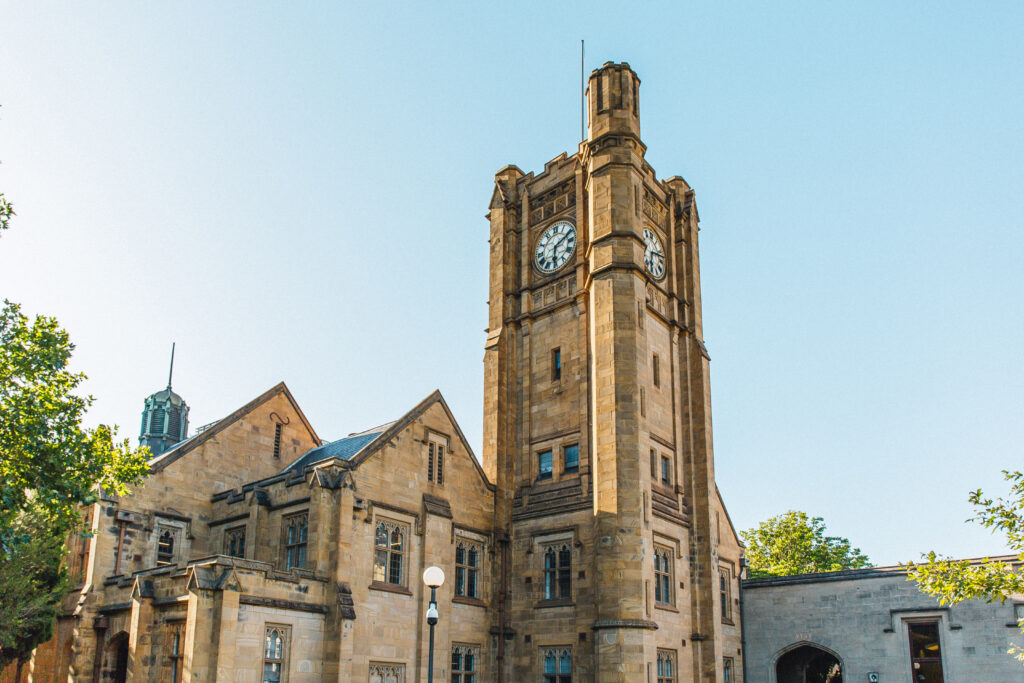
A Guide to Universities in Victoria

What is Vocational Education and Training (VET)?
How to apply for a PhD in Australia
Knowing where to start when applying for a phd can be tricky, especially when applying for one in a different country. this guide from monash university explains all the key information you need when applying for a phd in australia, amarpreet abraham, .css-76pyzs{margin-right:0.25rem;} ,, fiona lilley.
/student/advice/what-phd-advice-phd-students Applying for a PhD is a big step in anyone’s academic career. While it may sometimes seem like a daunting and often quite lengthy process, applying for a PhD shouldn’t have to be a chore and the way you do so varies by country and university. To make this process as clear as possible, Fiona Lilley from the graduate research office at Monash University in Australia answers the most pressing questions when it comes to applying, especially as an international student. With help from Monash PhD student and teaching associate, Amarpreet Abraham, this will be your go-to for all things PhD in Australia.
How can I apply for a PhD in Australia as an international student?
When applying to study a PhD in Australia, applicants are encouraged to identify possible academic supervisors and contact the faculty they would be enrolling in. Each university will have its own process, so it is important to familiarise yourself with the enquiry and application process. Not following the process or having the incorrect documentation can result in delays. For example, at Monash there is a two-step process. First, applicants submit an “Expression of Interest” (EOI) to the faculty where they intend to study; each faculty has different requirements, so it is important to check what is required. If the faculty determines that they have resources and facilities to support the student project, they will issue an Invitation to Apply (ITA), permitting the applicant to make a formal application for admission (and scholarships).

Get free support to study in Australia and New Zealand
Is there a correct/recommended way to look for a supervisor.
The right supervisory match for the student and their project is crucial. Universities have different processes – some require a supervisor to confirm they will supervise before an application; others may appoint a suitable supervisor for the student’s project. In Australia there is a requirement for all research students to have a minimum of two supervisors. Most universities will have several options to support applicants in identifying and connecting with supervisors, such as a Find a Researcher database. This is an extensive resource of all academic research in the university.
Top tip : Look for the “Available to supervise PhD” indicator on a researcher’s profile. “When looking for a supervisor it is important that they are involved in your field in some way. A prospective supervisor could be someone you have a pre-established positive academic relationship with, where you work well together or are aware of the expectations and boundaries from this academic,” says Amarpreet Abraham.
Do you have any tips for finding the right supervisor?
First step would be to decide which university you would like to do your PhD at and approach researchers depending on your interests – this could include emailing them with a brief research proposal and why they are best suited to your project. From there, the prospective supervisor can let you know if they are interested in your proposal/have availability to take on a new PhD student. “Picking someone with the knowledge of your field is important, but I would stress that choosing a supervisor who you have a positive working relationship with is even more vital,” says Abraham.
When should I start applying for my PhD?
Start initial conversations as early as you can. In some instances, potential supervisors may want to review a research proposal, interview the applicant and identify if the project scope is something that they have the capacity and resources or facilities to supervise.
There is no hard and fast rule on when you should start your application, but it is always advisable to start researching supervisors and topics as soon as you can.
How long will the application process take?
Each university will have different processes, deadlines and outcome notification dates. At Monash, it is generally six weeks after closing for the notification of either scholarship offer or admission offer to be sent.
This also depends on the time of year, volume of applications and, most importantly, whether the applicant has submitted all the required documentation, such as academic transcripts and evidence of English language proficiency.
How should I approach writing my research proposal?
Universities and supervisors will have different approaches to research proposals, so it is important to check and understand the requirements before you start. According to Abraham, “a research proposal should include a tentative title, an abstract, an introduction, proposed theoretical/conceptual framework, research questions, significance of the study, limitations, literature review, methodology/research approach, data collection and analysis methods, and a reference list. For all the criteria of the research proposal to be fulfilled, a lot of thought and discussion with your potential supervisor(s) is required. This allows you to voice your interests and approaches for your PhD, while your supervisors can make suggestions on what they think is best suited for your research. It is also important to note that all the elements of the thesis outlined above change/develop as the PhD candidature progresses.”
What are the associated costs of applying for a PhD in Australia?
This will differ depending on the university, and in some instances whether an applicant chooses to engage a registered agent to assist them with their application. At present, there is no application fee at Monash for international PhD or masters by research applicants. Other fees, including tuition fee costs, are published on university websites. Depending on the course, there may be associated costs for laboratory materials or travel for study (such as fieldwork). Applicants should check with the university and the faculty to understand what these may be. The Australian Government requires service providers to provide full details of course tuition and non-tuition costs in any formal offer or International Student Contract.

What would be your top pieces of advice for someone looking to apply for a PhD?
“Find a supervisor you work well with, be prepared, attend workshops around how to do research and practice self-care and self-kindness right from the beginning. It is easy to lose sight of boundaries when doing a PhD, but it is essential to look after yourself because life continues to happen at full speed while you are pursuing a PhD. I would also recommend getting involved in social research groups, as a PhD can be an isolating endeavour and having others who are in a similar position as you can be reassuring,” Abraham concludes.
You may also like

.css-185owts{overflow:hidden;max-height:54px;text-indent:0px;} How to apply for a PhD in the UK
Ben Osborne

How to apply for a PhD in the US
Giulia Evolvi
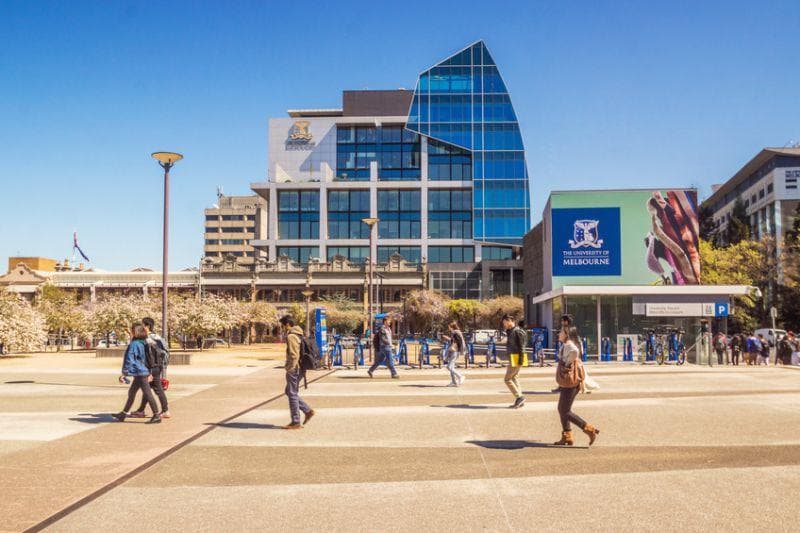
Best universities in Australia 2024
Register free and enjoy extra benefits

- Twitter (X)
HDR Fees and costs

All HDR Candidates
International candidates, bringing family to australia, domestic candidates, example of costs, self-funded candidates.
There are costs that all UNSW students need to pay, and these are outlined on the UNSW Fees page .
HDR candidates may have additional incidental costs associated with their degree. We have highlighted some of the key costs below but they will vary on a case by case basis.
Living costs: estimated minimum costs $35,000 per year, with $3,000 to cover set up costs. Yearly cost.
When undertaking a higher degree research program, it's important to consider the living costs associated with residing in Sydney including the cost of rent, groceries, transport and utilities.
See this page for more details.
Student Services and Amenities Fees (SSAF): 2023 cost $81.50 per term ($326/year). Yearly cost.
The SSAF is charged each term a candidate is enrolled and contributes to the provision of amenities and non-academic services for students. These services include counselling, employment, orientation, career advice, childcare, financial advice, health services, food services, sporting and recreational activities, student advocacy and legal services.
For further information, visit UNSW SSAF .
Field Work: varies
Candidates may be required to participate in field work during their degree. Costs will vary based on type of field work, location, duration, resources required and the level of funding provided by School/Faculty.
Conference attendance: varies
Candidates may attend conferences as part of their research training during their degree. Costs will vary based on type of attendance and presentation, location, duration, resources required, and the level of funding provided by School/Faculty.
Note: PhD candidates may apply for the DRTG funding to contribute to their conference funding.
Thesis submission related costs: varies
There are no costs related to thesis submission unless your Faculty, School or Supervisor, require you to have your thesis professionally edited or proof read prior to submission – contact your Faculty for more information.
An example of one quote for 100,000 words (average PhD):
Thesis editing: $4,400
Thesis proofreading: $2,500
Further incidental fees can be found here .
Tuition Fees Quarterly cost
If you are an International candidate, you are required to pay Tuition Fees for the duration of your candidature unless you have been granted a scholarship or sponsorship that covers these fees. You are required to pay a tuition fee deposit before your initial enrolment. Once you are enrolled, you will receive a fee statement each term.
If you enrol in approved coursework as part of your HDR program, you will not be charged any additional tuition fees.
For further information relating to fee payment and policy, please refer to the Student Fee Policy and Procedure .
Other costs
In addition to tuition fees, there are some of additional costs associated with your candidature.
Overseas Student Health Cover One off cost
As an International candidate, it is a condition of your student visa that you have Overseas Student Health Cover (OSHC) for the entire duration of your stay in Australia. You need to purchase your OSHC up front before you can enrol in your program, unless you have been granted a scholarship or sponsorship that covers this cost.
OSHC insurance cannot be paid in monthly or yearly instalments. You need to purchase a policy that covers the entire period of your student visa so that you can provide the DHA with a valid OSHC certificate when you lodge your student visa application.
If the insurance premium exceeds your credit card limit, you can make separate payments as long as you use the correct payment details.
The University's preferred provider is Medibank, however you can choose an alternate OSHC provider if you wish to do so. If you do decide to obtain your OSHC with Medibank, the University may receive a commission - this is used to improve services to students.
Visa Processing Fee 2023 cost $650. One off cost
You may need to pay a processing fee to the Australian Government Department of Home Affairs when you apply for your student visa.
If your family plans to relocate to Australia with you, there will be additional costs including Overseas Health Cover (OSHC), visa processing, relocation and living costs for your family members. Some estimated costs are outlined in the table below.
Note: UNSW Research Scholarships aim to support candidates through their UNSW study and are not intended to be used to support dependents.
Information to support you and your family is provided in the UNSW Bringing Family Guide .
Tuition Fees
Domestic HDR candidates at UNSW may be offered an Australian Government Research Training Program (RTP) Fees Offset Scholarship for four years for a Doctorate, and two years for a masters.
The RTP Fees Offset is paid to the University by the Australian Government on your behalf and is used by the University to offset your tuition fees so that you may receive free research training.
From 2023 the value of the Australian Government's support is in the range of $40,000 - $50,000 annually (subject to variation in later years based on actual HDR expenditure). UNSW bears any additional cost of tuition for the duration of the RTP.
For information on how to apply for the Domestic RTP Fee Offset, please refer to the HDR Scholarship Guidelines . For further information on UNSW tuition fees, please refer to the Student Fee Policy and Procedure .
No Coursework Fees
If you are required to enrol in approved coursework subjects as part of your HDR program at UNSW, you will not be charged any additional tuition fees.
The purpose of this table is to provide an example of the costs for HDR candidates.
The fees and costs provided below are estimates only, are not exhaustive, and will vary on a case by case basis.
Please note that the University reserves the right to vary student fees during enrolment in line with relevant legislation.
NOTE: Amounts are based on 2023 rates. Currency used in Australian Dollars (AUD).
*See table 'Additional Costs for Dependents' under Bringing Family to Australia
DISCLAIMER: (1) Required amounts displayed are flat rates based on 2023 fees only.
(2) Please be aware that tuition fees increase each year by approximately 5% and actual fees and costs charged may exceed the indicative figures listed.
(3) Fees shown are indicative only and subject to change without notice. Fees are reviewed annually and approved fees for the following year are published on the Fees and Payment site in August/September each year.
Further Resources
- UNSW Student Fees
- UNSW International Student Fees
- UNSW Student Services and Amenities Fee
- Australian Government Research Training Program
- Australian Government Student Visa Pricing
- Medibank Overseas Health Cover (OSHC)
If you plan to fund your studies yourself, you need to provide some additional information to support your application for admission.
If you plan to fund your fees and living expenses yourself, please attach the following documents to your application for admission:
- Bank statements showing that you have accumulated enough funds over the past 6 months to cover all of your expenses for the duration of your degree. If you are applying for an Engineering degree, you need to show that you have enough funds for 2 years of study (Masters), or 4 years (PhD). For all other Faculties, you need to have enough funds for 1.5 years (Masters) or 3 years (PhD).
- Completed UNSW Financial Declaration form .
Please refer to the “Combined Costs and Tuition Fees” table in the "Example of Costs" tab for a summary of the costs you will need to show that you can cover.
If the bank statement you have provided is for a bank account that is not in your name, the account holder must declare that the funds will be used for your studies fees and costs on the UNSW Financial Declaration form .
Please outline your financial capacity to fund your studies in section 3 of the UNSW Financial Declaration form . This outline should be no more than 1-2 sentences in length.
Have questions? Contact us
+61 2 9385 5500
Fees and costs
- Student Connect
- Ground floor, 18 Wally’s Walk
- Macquarie University
- T: +61 (2) 9850 6410
- E: [email protected]
Annual student contribution amounts
Find indicative costs for each band and subject area
Grandfathering student contribution cost
Information on grandfathered and non-grandfathered costs
Understanding the payment process
Choose a payment option that is right for you
Quick links
- Student Services and Amenities Fee (SSAF)
- Refund guide
- Fee-HELP booklet
The costs of a research degree
As a research student at Macquarie University, you will need to understand the costs involved with your degree and the fee payment process.
Research degree fees vary depending on whether you are a domestic or international student.
Ways to save on your tuition fees
Domestic and international students can save time and money if eligible for a scholarship or Recognition of Prior Learning (RPL). There is also financial help for domestic students and some support is available to international students.
Financial assistance
View the range of financial support initiatives.
Get credit for relevant prior studies.
Scholarships
See the scholarships available to students.
Domestic students
You are a domestic research degree student if you are enrolled in a research degree and are one of the following:
- an Australian citizen or permanent resident
- a New Zealand citizen
- an Australian humanitarian visa holder.
How you add up your fees
When working out the cost of your BPhil tuition, you will need to take into account:
- course type and unit cost
- student services and amenities fees, textbooks etc.
Research degrees
There are different domestic fee structures for the two types of research degrees.
Bachelor of Philosophy/Master of Research
- First year – Commonwealth Supported Places (CSP) are available for domestic students enrolled in the Bachelor of Philosophy/Master of Research (BPhil/MRes). You will also be required to pay the Student Services and Amenities Fee (SSAF) .
- Second year – you’ll be offered the Research Training Program (RTP) fee offset scholarship from the Australian Government so you don’t need to pay fees. This scholarship covers the cost of your course for the minimum duration.
The Bachelor of Philosophy is an approved course for the purposes of student income support. Students may be eligible for student income support payments such as Youth Allowance or Austudy, provided all other qualifications are met. Check with Services Australia (was Centrelink) directly for further information.
Doctor of Philosophy/Master of Philosophy
Domestic candidates enrolled in either the Doctor of Philosophy (PhD) or the Master of Philosophy (MPhil) program are funded by the government under the Research Training Program (RTP) .
Students are entitled to a maximum of three years’ full-time equivalent study if undertaking a PhD, and a maximum of two years’ full-time equivalent study if undertaking a MPhil.
Candidates with incomplete research degrees will have their prior candidature period deducted from their full RTP entitlement when they enrol.
International students
If you are studying with us on an international student visa, you’re considered an international student and must pay international fees. Find out more about our international student fees .
International fees per faculty
Learn more about fees for degrees in each of our faculties below.
Faculty of Arts
Faculty of medicine, health and human sciences, faculty of science and engineering, macquarie business school.
*Total annual cost is based on 80 credit point for a full-time study load.
**Total annual cost is based on two enrolment periods at a full-time study load.
Refunds of any fees paid must be in line with the Higher Degree Research International Fee Refund Policy .
Download 2023 international tuition fees document .
International Out of Time (iOOT) fee
Candidates who apply for and are approved for an extension of Expected Work Submission (EWS) date in accordance with the HDR Variations to Candidature Policy will be charged a flat rate of AUD $2000 for a three-month extension (iOOT fee).
Candidates can apply for a cumulative maximum of 1 EFTSL (PhD/MPhil) or 0.5 EFTSL (MRes Y2) in accordance with the policy, and each extension application of three months will incur a flat rate $2000 charge.
- Candidates will be expected to apply for an extension of EWS date before the expiry of their candidature.
- If you do not pay your iOOT fee by the payment due date, late payment penalties may also apply.
- Applicable to MRes Y2, MPhil and PhD only. See further details below.
MRes Y2 candidates
- Candidates will not be liable for full tuition fees for more than one year (full time equivalent) of the MRes Y2 program.
- Candidates may apply for up to two extensions of EWS date for three months at a time.
- The first extension of candidature for MRes Y2s for three months up to the end of January (for Session 1) or end of July (Session 2) will not incur a charge of full tuition fees or a write up fee.
- $2000 iOOT fee will apply for the second approved application for extension of EWS date.
- When a candidate has an approved extension, marks are not deducted should they submit on or before their new EWS date.
MPhil/PhD candidates
- Candidates will not be charged full tuition fees for the period beyond their standard period of candidature. The standard period of candidature is defined in the Higher Degree Research Rules .
- Candidates may apply for up to four extensions of EWS date for three months at a time.
- $2000 iOOT fee will apply for each approved application for extension of candidature.
- Where candidates are Macquarie University funded scholarship holders, the first approved application for extension may include an extension of stipend, where the candidate applies and is approved for an extension under the Macquarie COVID-19 Extension Scholarship Scheme. In these circumstances the iOOT fee will not apply.
iOOT fee FAQs
Can I apply for six months’ extension?
PhD and MPhil can apply for a six-month extension in accordance with the HDR Variations to Candidature Policy, however you will be charged for two three-month periods (2 × iOOT = $4000).
I have a scholarship, will it cover my iOOT?
Scholarships for international candidates funded by Macquarie University do not cover the iOOT fee. If you have an externally funded scholarship you will need to check with your provider or sponsor.
I don’t need three months; can I apply for less than a three-month extension and pay a lesser fee?
No, if you apply for an extension of EWS date you will be granted three months, for a flat rate of $2000. This is not pro-rata.
Can I submit before the end of my approved extension period?
Yes, you can submit before the end of your approved extension. If you submit your thesis within one month of your original EWS date after applying for a three month extension, the fee will be reversed and you will not have to pay.
When is the fee due?
The fee due date will be displayed in your eStudent account. It will be due one month from your original EWS date.
Will I have to pay the iOOT fee for my first extension if I have received a COVID-19 Extension Scholarship (not applicable to MRes)?
No, candidates who are eligible and who are approved for the COVID-19 Extension Scholarship Scheme will be granted up to three months’ stipend and tuition scholarship, and for this first extension will not be charged the iOOT. Subsequent extension will be subject to the $2000 flat rate fee for each three month extension of EWS date.
I haven’t submitted an extension of EWS date, will I be charged the fee?
You will only be charged the iOOT fee of $2000 when you apply for an extension of EWS date. If you do not submit your thesis and you have not obtained an EWS date extension your candidature may be ceased in accordance with the HDR Variations to candidature policy.
I withdrew from my program without applying for an extension and now I want to re-enrol to submit my thesis, will I be charged?
If you withdrew on or after your original course EWS date, yes, when you apply to re-enrol to submit your thesis you will be charged the iOOT $2000 fee and be given three months in which to finalise and submit your thesis. If you submit in the first month the fee will be reversed, and you will not have to pay.
I am a cotutelle candidate, will I have to pay?
Yes, cotutelle and joint PhD candidates who apply for an extension will be subject to the $2000 iOOT fee on application for a three-month extension of EWS date.
Will the fee apply when I am completing my thesis corrections?
No, if you are completing thesis corrections following an examination outcome of Award with Corrections you will not be charged tuition fees and you will not be required to pay the iOOT fee.
I have been asked to revise and resubmit my thesis, what fees will I have to pay?
You will not be required to pay full tuition fees for the period of enrolment for revision and resubmission of the thesis. However, you will be charged the iOOT fee for each three months of enrolment (4 × iOOT = $8000).
Funding opportunities
Opportunities are available for scholarship funding.
Master of Research
The University offers a limited number of scholarships to international MRes students through the competitive IRTP (International Research Training Program) scholarship round each year.
- Applicants for admission to PhD who are offered entry to MRes Year 2 and three-year PhD, and who rank competitively for IRTP scholarship, may be offered a scholarship to cover their MRes Year 2 tuition fees and a living stipend.
- PhD scholarships for MRes graduates progressing to a PhD are awarded through a competitive ranking process. The three-year PhD scholarship covers the tuition fee and a living stipend at the rate of the Research Training Program (RTP).
Learn more about scholarships for international MRes and progressing candidates.
Macquarie University has also partnered with specific overseas universities to provide co-funded scholarships to eligible international MRes applicants.
Candidates are encouraged to apply for advertised scholarships.
Scholarships for graduate research at Macquarie University are available for specific projects or in the general scholarship main rounds.
Learn more about scholarships for international PhD/MPhil candidates.
You're viewing this site as a domestic an international student
You're a domestic student if you are:
- a citizen of Australia or New Zealand,
- an Australian permanent resident, or
- a holder of an Australian permanent humanitarian visa.
You're an international student if you are:
- intending to study on a student visa,
- not a citizen of Australia or New Zealand,
- not an Australian permanent resident, or
- a temporary resident (visa status) of Australia.

Is a PhD worth it?
Careers Published 8 Feb, 2024 · 9-minute read
Studying a higher degree by research isn’t something you choose to do overnight – well, not for most people. So, to help you make this decision, we’ve reached out to some alumni and compiled some data to help you work out if a Doctor of Philosophy would be worthwhile for you.
When you’re considering such a big academic step, it’s normal to wonder: is a PhD worth it?
Anecdotal evidence and statistics both tell us the benefits of PhD study do indeed outweigh the time and effort required. Let’s explore:
- why a PhD is worth it (personal and professional benefits)
- worthwhile reasons to pursue a PhD
- the average salary of a PhD graduate (financial value of a PhD).
Is it worth doing a PhD? (Personal and professional benefits)
For UQ PhD alumni Angie Knaggs, Benjamin Jones and Brigid Lynch, answering this question in hindsight is easy – and the answer is a resounding yes . Their stories may help you make this choice without that advantage of hindsight.
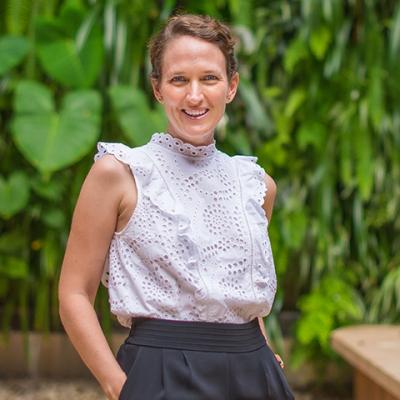
My PhD is as much a part of my identity as the colour of my hair.
Angie’s PhD was a natural continuation of the theses she wrote during her honours and master’s programs, focusing on popular culture representations of masculinity in crisis. In short, she studied the connections in language, culture and communication in shows like Prison Break – rather than watching them for the drama like most of us do.
“I’ve always connected strongly with work in gender and performativity,” says Angie.
“I found the deep dive into thinking and analysis rewarding and engaging. My final thesis remains the piece of work I’m most proud of – even after a decade!”
Her career after completing her PhD was rocky at first. But, as is often the case, the hurdles in the journey ended up emphasising the successes.
“I was very focused on applying for an early-career academic role with the aim of becoming a full-time academic,” says Angie.
“I had experienced a good deal of academic success, and I had publications in top journals. I felt certain I was in a good position to achieve my dreams.
“I went to interview after interview, and it was disheartening to hear how I was almost it or not quite it . What it was, I could never quite work out, but it became increasingly clear to me that I didn’t have it .”
After tutoring and course convening at multiple universities for a while (and quickly growing bored of the constant commuting between campuses), Angie decided to apply for some roles that looked fun and interesting, even if they weren’t at traditional universities. This is how she accidentally fell into – and fell in love with – a whole new world: teaching film studies .
Angie’s new path eventually led to her current role as Senior Learning Specialist – Employability with UQ’s School of Languages and Cultures . Here, she uses her intercultural competencies and higher order thinking skills to great use, as well as publishing about her work in international journals.
“I don’t think I would have been open to following a new pathway if I hadn’t let go of the assumption that my doctorate automatically meant I would have a traditional academic career,” she says.
“Letting that go involved some deep self-work, but it was worth it.”
Now, with over a decade to reflect, Angie sees her PhD as an essential part of how she got to where she is today as well as a vital factor in all her successful career steps along the way.
“I like to think of my PhD as the ultimate employability bootcamp,” she says.
“My PhD gave me an edge – a way of thinking about problems in different ways. It taught me resilience, the ability to pivot and the ability to give and receive feedback. It has also helped get my CV to the top of the pile.”

My PhD equipped me well to move in and out of different roles until I found the one which was best for me.
Ben's career has evolved quite a lot since completing his PhD, in which he investigated the rehabilitation and revegetation of bauxite tailings.
"I chose this topic as I'm interested in environmental science," he says.
"I thought that mine rehabilitation was an important and in-demand area which I could contribute to."
And he has indeed been contributing to this field – most recently in his role with the Queensland Department of Environment and Science, which has allowed him to do satisfying and technical work behind the scenes on high-profile projects. His journey since graduating has been filled with rewarding stepping stones across various positions.
"I've worked in academia and within the private and public sector," says Ben.
"My PhD equipped me well to move in and out of different roles until I found the one which was best for me."
The benefits of a PhD have been obvious and numerous to Ben, both in terms of the career opportunities and lifestyle advantages available. But these benefits aren't necessarily things you have to wait for – you may experience some of them while studying.
"From a remuneration perspective alone, some industry PhD scholarships are quite attractive," says Ben.
"They also offer flexible working hours, and this offers time for other commitments."
"Workplaces are becoming more competitive, especially for recent graduates. Attaining a PhD provides graduates with valuable work experience and specialist knowledge within their chosen field."
Ben recognises a higher degree by research isn't for everyone, but he also sees multiple reasons why a PhD is worth it for candidates.
"Obtaining a PhD is only one of many options, and having a PhD isn't a prerequisite for success," he says.
"However, a PhD is a requirement for many positions within academia or research, so for people embarking on this career path, a PhD is likely essential."
He also believes the PhD path can provide:
- a great opportunity for graduates to ease into working life while still enjoying the familiarity of university life
- a fantastic environment filled with talented and hardworking people, where graduates who haven't landed their dream job can gain work experience and improve their career prospects .
Ultimately, Ben believes the decision of whether to pursue a PhD comes down to personal circumstances and goals.
"I think people need to weigh up their different options and decide what’s best for them."

I now get to work with some of the world's most talented and inspiring epidemiologists. I couldn't think of a better job.
Brigid completed a PhD in population health, looking specifically at how physical activity could impact quality of life for colorectal cancer patients. Her motivation and drive came from combining her previous study areas with a personal passion for the topic.
“The project brought together my undergraduate training (Human Movement Studies and Psychology at UQ) with my interest in epidemiology,” says Brigid.
“So, it was something I could really commit to for the long haul.”
Not long after finishing her PhD, Brigid received a postdoctoral fellowship from the National Health and Medical Research Council, funding her for 2 years of international work followed by 2 years back in Australia.
“Having a PhD is a passport to live and work around the globe,” she says.
“As a postdoctoral fellow, I moved to Alberta, Canada, to work with one of the world’s leading researchers in the physical activity and cancer field. After 2 years of snow and Chinook winds, I returned to Australia.
“One of my career highlights was being funded to spend 3 months working at the University of Bristol. Being able to work and study abroad has opened up a lot of opportunities for research collaboration.”
Brigid is now Deputy Head of the Cancer Epidemiology Division at Cancer Council Victoria.
As someone who continues to work in research, Brigid says the benefits of having a PhD are still obvious to her every day. However, she also recognises how a higher degree by research can help those who follow other paths – just like Angie.
“Even for people who want to work in industry or for government, I think there are very clear benefits of a PhD,” says Brigid.
“So many of the skills you develop when doing a PhD are transferrable, such as project management, critical thinking and strong communication.”
An unexpected benefit of a PhD
While Angie and Brigid’s thesis topics and PhD journeys were quite different, there’s one thing they have in common: the first thing that came to mind when asked for the highlights of studying their PhD at UQ. They both went straight to talking about the people.
“The colleagues and friends I met along the journey are a highlight,” says Angie.
“My supervisor remains one of my closest friends and a long-time mentor.”
Brigid whole-heartedly agrees.
“I met some great people along the way, many of whom I still work with in one way or another,” she says.
“I really enjoy dropping into the School of Public Health when I’m in town.”
Building a supportive network was a key benefit for Ben, too.
"My research organisation placed a high value on networking and provided opportunities to grow," he says.
"I've remained in contact with my PhD supervisor and some of my colleagues, and this has given me a network of old friends at UQ."
Doing your PhD at UQ means you'll get to create connections with some of the most influential and highly cited researchers in the country . And yes, some of these researchers might just become your lifelong friends.
Reasons to pursue a PhD
A good way to determine whether a PhD is worth it for you is to consider your motivations – what are your reasons to do a PhD?
For Angie, this boils down to asking yourself 2 key questions:
- Why do you want to do a PhD?
- What do you want to get out of it ?
Hint from Angie: “If the answer to either question involves any person other than yourself, that’s a red flag. You should only ever do a PhD for yourself. It will be the toughest challenge you ever set for yourself – and it’s only worth doing if you’re doing it for yourself.”
Brigid suggests adding these 2 questions to your decision-making process:
- Are you passionate about your field and topic?
- Can you make a difference to the community or contribute new knowledge that could make change happen?
If your reasons to do a PhD are genuine and you have a strong vision of what you’ll study and why, this may make your decision clearer.
The financial value of a PhD
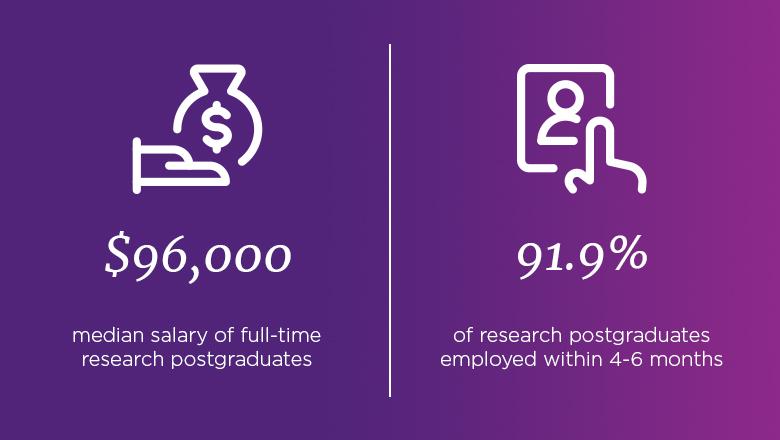
Reading Angie and Brigid’s stories may lead you to think that most candidates are driven solely by their passion for research and that the PhD starting salary is irrelevant. But this is a valid and common consideration for many people. After all, knowing what to expect from a PhD graduate salary can help you justify pursuing your doctorate and plan appropriately for your future career.
The median salary of a PhD graduate is around $96,000pa , though it’s important to note this figure can vary significantly depending on your field.
Wondering if you'll get a PhD income while you study? Find out more about living stipend scholarships .
While making decent money is an enticing perk, perhaps the more important financial benefit of having a PhD is the higher chance of getting (and staying) employed in the first place. According to QILT's Graduate Outcomes Survey , in 2022, the overall employment rate for postgraduate research students in Australia was 91.9%, with 84.7% of graduates in full-time employment.
A comprehensive report from Ribit.net and the Australian Mathematical Sciences Institute shows there is increasing demand for PhD graduates across many industries in Australia. Some of the nation’s most competitive firms are recruiting higher degree by research students from a wide range of disciplines. This further proves Angie and Brigid’s point about PhD research equipping graduates with transferrable and highly employable skills – skills that are recognised beyond the realm of academia.
So, what makes PhD graduates so employable? Well, at UQ, we expect our Career Development Framework plays a large part. This gives all our researchers access to workshops and other opportunities to capitalise on their research skills and turn them into industry practice.
UQ is also home to UniQuest , leaders in research commercialisation. Our researchers can work with UniQuest to translate their academic discoveries into commercial products, effectively taking their research to market.
Whether you’re driven by personal passions, academic ambitions, financial goals or a combination of all these reasons to pursue a PhD, the evidence is strong: a PhD is worth it.
Start your journey today
Share this Facebook Twitter LinkedIn Email
Related stories

How long does a PhD take?
3-minute read
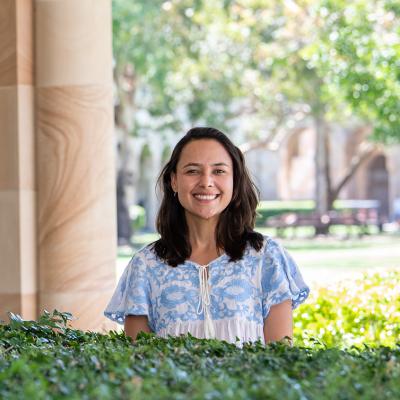
Why do a PhD at UQ?
7-minute read

How to get a PhD scholarship or funding
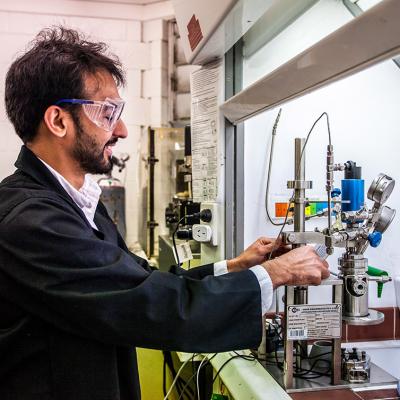
Can you do a PhD without a master’s degree?
6-minute read
- Directories
Domestic postgraduate research tuition fees
All domestic students enrolled in a postgraduate research program, such as a Doctor of Philosophy or Master of Philosophy, are awarded an Australian Government Research Training Program (AGRTP) Fee Offset Scholarship.
The AGRTP is funded by the Commonwealth government and provides support to students completing a research degree program.
The AGRTP Fee Offset Scholarship provides support for the research program up to a maximum of two years (full-time) for a Masters program, and up to four years for a PhD program (or part-time equivalent). This means that domestic students are exempt from paying tuition fees for this period of time.
If you enrol in additional subjects/courses during your enrolment you may incur tuition fees.
Research students are required to pay the services and amenities fee.
Advisory information
- Services & amenities fee
Reference documents
- Schedule of Tuition Fees 2024 (PDF, 150.28 KB)
Use contact details to request an alternative file format.
Related websites
- Research Training Program
- 135 ANU (135 268)

IMAGES
VIDEO
COMMENTS
Agriculture and environmental studies, dentistry, engineering, human movement, medical studies, natural and physical sciences, pharmacy, psychology, veterinary science. $52,604. $26,304. For the most up-to-date tuition fees, visit the HDR tuition fees page. Of course, everyone's PhD journey differs, and students can take anywhere between 3 ...
How much does a PhD cost in Australia? Funding and researching a PhD can be expensive. In Australia, candidates can expect to pay 40,000 AUD- 60,000 AUD. Dedicated scholarships can help support your PhD, and it is rare for a PhD student not to be supported by some form of bursary, grant or scholarship. Study a PhD in Australia
PhD fees. As an international student in Australia you'll pay fees at a higher rate. The Australian government estimates that typical international PhD fees are between AUD $20,000-50,000 (USD $12,740-31,850) per year. This is what you can expect to pay if your project doesn't have funding attached or you're proposing your own topic.
How Much Does PhD Cost in Australia? The cost of pursuing a PhD in Australia varies depending on the university and the course. According to the Australian Government, fees to study a PhD in Australia range from AUD $18,000 to AUD $42,000 per year for international students.
Internationally renowned research - 15 of Australia's world leading universities rank in the global top 250.; Generous funding options - It's unlikely you'll have to pay for your entire PhD out of your own pocket. Many PhD scholarships and other funding opportunities are available from universities and the Australian Government.; Unique PhD opportunities - From Marine Biology at the ...
How much does a PhD cost in Australia? The cost of a Doctor of Philosophy (PhD) degree will vary depending on the education provider you choose. When you study with us, your degree will cost approximately AUD 31000 (Domestic full fee paying).
The cost of your PhD in Australia can depend on whether you receive any funding support or whether you pay the tuition in full. The cost of tuition for an international student can be between AUD $20,000 and $50,000 per year (USD $13,168-32,280). It is possible you may not have to pay the full tuition fees as many projects come with funding ...
Education in most of the world is expensive and, sadly, Australia is no exception. Fees vary between universities and courses, but the Australian government's Study Australia website offers a single place to get an overview of the courses available and their costs.. For both Bachelor's and Master's degrees, fees range between AU $12,000 to as much as AU $65,000 a year.
What is a PhD scholarship? A PhD scholarship is much like any scholarship - it supports a PhD candidate to complete their studies. PhD scholarships are offered by a variety of universities, specific schools, and research institutes. For example, at The University of Queensland (UQ), there are 2 categories of PhD scholarships you can consider:
We have a wide range of government and University funded scholarships available. Find a scholarship. PhD and research degree scholarships can cover tuition fees and living allowances paid as stipends. Most scholarships are awarded in the annual scholarship round. You can view the annual scholarship round key dates here.
According to the Australian Government, fees to study a PhD range from A$19,000 to A$78,000 per year, depending on the education provider. There is a chance you may not have to pay the full amount if there is funding available, which is common in Australia. Most universities have funding for promising PhD students set aside.
While it may sometimes seem like a daunting and often quite lengthy process, applying for a PhD shouldn't have to be a chore and the way you do so varies by country and university. To make this process as clear as possible, Fiona Lilley from the graduate research office at Monash University in Australia answers the most pressing questions ...
See this page for more details. Student Services and Amenities Fees (SSAF): 2023 cost $81.50 per term ($326/year). Yearly cost. The SSAF is charged each term a candidate is enrolled and contributes to the provision of amenities and non-academic services for students. These services include counselling, employment, orientation, career advice ...
university in Australia, Adelaide has a rich and proud history. Associated with 5 Nobel laureates Group of Eight member One of Australia's most Ranked liveable cities 88 in the world* Produced over 110 Rhodes Scholars Global alumni network * Times Higher Education, 2023. Getting your PhD 4 5 Getting your PhD
Check with Services Australia (was Centrelink) directly for further information. ... 2024 approximate annual cost. 2024 commencement fee. PhD in Health Innovation. 085032M. $51,900. $25,950. PhD in Biomedical Sciences. 085032M. $51,900. ... If you do not pay your iOOT fee by the payment due date, late payment penalties may also apply. ...
The average annual fees for PHD in Australia is 40,000 AUD- 60,000 AUD (16- 33 Lakh INR). After completing a PhD in Australia one can work as a Research Scientist, R&D Manager, Research Officer and earn an average salary of 85,000 AUD (46 lakh INR).
Your Deakin tuition fees depend on the type of student you are, the course you study and the year you commence. Follow these steps to estimate your course fees: Select an option in each field. Your selections should reflect the study options you're considering. Select a course by typing the course name or code. Then select from the drop-down list.
Australian students. Citizens and permanent residents of Australia and New Zealand are exempt from paying a contribution toward the cost of their research courses if UWA provides them with a Research Training Program place.. This exemption applies for up to four years' full-time equivalent study for a doctorate by research and two years' full-time equivalent study for a master's by research.
Anecdotal evidence and statistics both tell us the benefits of PhD study do indeed outweigh the time and effort required. Let's explore: why a PhD is worth it ... funding her for 2 years of international work followed by 2 years back in Australia. "Having a PhD is a passport to live and work around the globe," she says. "As a ...
For graduate degree programs, annual fees can range from AU$45,360 (~US$31,004) and reach up to AU$47,940 (~US$32,780). PhD programs are priced similarly, starting at the end of the scale, from AU$ $39,870 (~US$27,249) upwards. In a league of its own, however, is ANU's Doctorate of Medicine and Surgery degree, which costs AU$85,120 (~US$58,184).
Domestic postgraduate research tuition fees. All domestic students enrolled in a postgraduate research program, such as a Doctor of Philosophy or Master of Philosophy, are awarded an Australian Government Research Training Program (AGRTP) Fee Offset Scholarship. The AGRTP is funded by the Commonwealth government and provides support to students ...